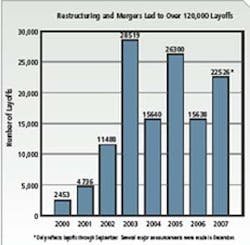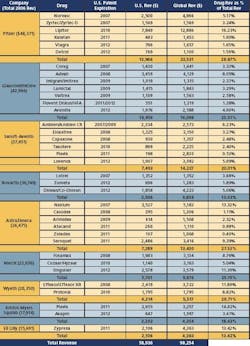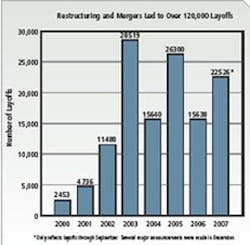The Prepared Mind: Maintaining Career Optimism during Changing Times
Editors Note: This article, Part 1 of a two-part series, is excerpted from The Continuing Evolution of the Pharmaceutical Industry: Career Challenges and Opportunities, published in December 2007 by Michael Steiner and colleagues at RegentAtlantic Capital, LLC. Part 2 will appear in Februarys issue. To access the full original version of this report, click here.
Everyone working in the pharmaceutical industry knows that it is undergoing a vigorous evolution. Much has been written about how pharmaceutical companies will need to change the way they do business in order to remain profitable in a new and unfamiliar competitive landscape. However, there has been little published on what this evolution will mean for the careers and lives of industry participants. Similarly, there is a paucity of information on what people can do to prepare for the new environment in which they will soon find themselves.
This studys goal is to fill this gap. We hope to provide a 30,000-foot view of trends and a roadmap for industry professionals to better understand what the coming macro changes to the business will mean for their careers and where the best pharmaceutical job opportunities will be.
More importantly, it is intended to identify the career planning steps that can be taken today that will allow them to capitalize on the many changes coming in the future.
The Ideal Career
For a new college graduate in the early 1980s, there were few better opportunities than working for a pharmaceutical company. During this time, pharmaceutical companies and their employees had a paternalistic relationship. Pay was good and employees retirements were secure, with robust pensions. Jobs were stable and benefits unbeatable.
Many of these companies also shared their great successes with their employees. These organizations showered down large numbers of stock options as an integral component of each persons compensation. They also allowed their employees to acquire company stock at a substantial discount through their company stock purchase programs. And as these companies stock prices soared, many long-term pharmaceutical company employees became millionaires.
Forces of Change
A series of forces have made pharmaceutical companies current business models obsolete. These forces can be grouped into three categories:
1. Revenues are under pressure
- Patents on numerous high-revenue drugs are expiring.
- Pipeline for new drugs looks uncertain.
- More powerful payers. A series of mergers has created a handful of very powerful payers. Currently, only 10 firms control nearly 56% of the managed care market. In the past, physicians were the key decision-makers as to which drugs were used by patients.
- Lower cost medications.
2. The costs and risks of developing new drugs are increasing
At the same time that the pharmaceutical industrys revenues are under pressure, the costs and risks associated with the development of new drugs are increasing for a number of reasons. First, many of the drugs currently under development are aimed at treating conditions that have more complex and difficult targets.
Second, unlike in the past when the R&D process was frequently driven by obvious commercial applications, todays R&D is often driven by new scientific discovery, a process that is far less predictable. Third, the regulatory approval process has become significantly more complex and costly. The regulatory agencies are more sophisticated, capable, cautious and conservative in evaluating drugs than in the past. Fourth, the current plaintiff-favorable litigation environment continues to be a drag on pharmaceutical company profitability.
Since 2000, 65,000 product liability lawsuits have been filed against prescription drug makers more than in any other industry. Finally, payers are slowly shifting to an outcomes-based analysis of treatment alternatives. Consequently, predicting the potential revenue from a new treatment has become more difficult.
3. Globalization
The most powerful force sweeping through the industry, however, is the globalization of this industry. What had historically been a U.S.- and E.U.- focused business is now shifting to developing countries both for the development of new treatments and as potential markets for products.
Big Changes for the Pharmaceutical Industry
The confluence of these factors is compelling pharmaceutical companies to reengineer their business models, identify their core competencies and focus on what they do best. Consequently, the following trends in the pharmaceutical industry will continue, and even accelerate, in the future:
1. Corporate Restructuring
- Job Reductions. From 2003 to 2006, the industry witnessed about 86,000 layoffs. No one can precisely predict how many additional people will be displaced. However, two CEOs interviewed believe that an entire generation of upper-middle and senior-level executives (as many as 50,000 individuals) will be displaced.
- Further consolidation within the industry.
- Refocusing on fewer business lines.
- Outsourcing.
2. Adoption of Risk Reduction Strategies
- Acquisitions rather than development of compounds.
- Use of joint ventures and research consortiums.
3. Evolution of Drug Marketing
- Increased focus on U.S. payers.
- Drugs marketed globally.
What Does It All Mean?
As the pharmaceutical industry adapts to the forces changing its business model, it will not only survive, but thrive. However, the adaptation process over the next five to 10 years will be very disruptive for many and will create far-reaching consequences for any individual working in this field. These changes will make working at a pharmaceutical company less predictable, and individuals will increasingly need to think in terms of a career in the industry and not at just one company. And the skills in the highest demand by employers in the future will differ from those in the past. The reshaping of the industry will also unlock unforeseen opportunities for those individuals who are able to anticipate the changes, prepare for and take advantage of them.
Figure 1. Expiring Patents Drive Industry Change (Rev = revenues, all figures in $U.S. millions)
Six Future High-Growth Areas
Six segments of the pharmaceutical industry will offer particularly high growth potential:
1. Commercialization of dormant compounds In the freezers of pharmaceutical companies are thousands of compounds that were abandoned prior to FDA approval, or that were approved but not commercialized. Finding ways to reposition or repurpose these compounds is a high-growth opportunity. Additionally, by repurposing a compound, a pharmaceutical company can extend the life of its patent.
2. Generic or biosimilar versions of biologics The development of generic or biosimilar versions of biologics will also be a high-growth area. While the development and manufacture of such treatments remains difficult and expensive, the size of the market (today, 25% of the new drugs coming to market are biologics) and the near-term expiration of patents on some of the highest-revenue biologics makes it a compelling opportunity.
3. Improving the efficiency of R&D The rapidly increasing costs and risks of developing drugs have led to the creation of a fast-growing business within the pharmaceutical industry: finding ways to improve the efficiency of the R&D process. In particular, there will be great interest in discovering ways of improving the ability to identify early in the research process (and prior to the incurrence of significant costs) those drug targets that are inherently intractable and undruggable or are potentially toxic to humans and therefore not viable pursuits.
4. Oncology and central nervous system disorders R&D As the life expectancy for the U.S. population continues to grow, larger portions of the population will be afflicted with conditions such as Alzheimers disease and dementia. In addition, cancer will be an even bigger cause of mortality.
5. Stratified medicine and diagnostics While cost-effective personalized medicine likely remains decades away, stratified medicine particularly in the field of diagnostics represents a high-growth opportunity in the near term. This field will focus on finding ways to slightly alter the composition of different medications to make them more effective for sub-segments of the patient population.
6. Fusion of pharmaceuticals and consumer goods While the regulation of consumer goods is nothing new, consumer goods companies, plagued by recent scares from poisoned dog food and toothpaste among other things, are now under far more scrutiny. They also view the areas of health and wellness products as high-growth opportunities. Consequently, consumer goods firms increasingly will seek individuals with experience in the pharmaceutical industry.
Seven Highly-Valued Skill Sets
The six areas cited above will offer great growth potential and, therefore, some of the best employment opportunities over the next decade. However, the changes sweeping through the industry will also create demand for the following seven skill sets:
1. Manage decentralized intellectual capital resources
As more pharmaceutical companies shift to decentralized business models, they will look outside their walls for much of the intellectual capital needed to develop new drugs. Contract research organizations (CROs), independent contractors, research consortiums, universities and foreign laboratories will play increasingly integral roles in solving complex problems more cost-effectively. Individuals able to simultaneously and effectively manage all of these internal and external intellectual capital resources will be in great demand across the industry.
2. Work in joint ventures and across divisions, cultures and countries
The pharmaceutical industry is shifting from fully integrated businesses focused largely on the United States and E.U. markets to more decentralized business models that operate and compete in a global market. This shift will create a demand for individuals who can navigate the demands of working in joint ventures and across divisions within one company, as well as those who have the ability to work with people from different countries and cultures (which requires experience with different languages, regulatory environments and attitudes about life and work).
3. Integrate an understanding of intellectual property laws, scientific expertise and business strategy
Recent advances resulting from the Human Genome Project have led to a flood of patents by companies on different gene sequences. The existence of these patents complicates the development of new drugs because it is unclear whether many (if not most) of these patents are enforceable. Consequently, there will be great demand for those individuals who can integrate an understanding of intellectual property laws (in particular, case law) with a deep understanding of science and business strategy.
4. Spur creativity while managing commercially
In the past, pharmaceutical companies largely operated as silos. The economic demands on pharmaceutical companies will force them and all of their employees to place much greater emphasis on finding ways to generate revenues faster. These organizations will need managers who can somehow strike a balance between two conflicting forces: instill a sense of commercial urgency in the development of new products, and do it in a way that still allows the natural creativity of the people in these laboratories to blossom.
5. Knowledge and insight on the decision-making dynamics of payers
The significant shift in bargaining power from pharmaceutical companies to payers has created substantial demand for individuals who have a comprehensive understanding of these organizations.
6. Expertise in the functioning and decision-making of regulatory agencies
One of the industrys most urgent needs is to reduce the time involved in developing and bringing new drugs to market. Regulatory agencies both in the U.S. and abroad are often some of the biggest obstacles to rapidly commercializing a new treatment. Consequently, there will be great demand for regulatory specialists that is, those individuals who have developed an expertise in how these organizations function and relationships with the individuals who work in them who can help accelerate the approval process for a particular category of drugs.
7. Human resource skills
Finally, as pharmaceutical companies reengineer their business models, they will need to change the types of people they recruit (and seek to retain) and the programs in which they develop and train them. They also will need to redesign compensation structures and create new career paths for most significant positions in the organization.
Human resources managers who can efficiently administer these changes will play a critical role in the evolution of traditional pharmaceutical companies. While there will be countless new opportunities resulting from the industrys transition, this new environment also (sadly) means that the relationship between pharmaceutical companies and their employees will change. The paternalistic environment of a quarter century ago that offered the implied promise of a safe, well-paying career at one employer as well as long-term financial well-being is economically unsustainable. Consequently, individuals who work in this industry must also recognize that they now have two businesses to run. In addition to managing their careers, they must manage their wealth. The choices they make will impact their future financial well-being.
Career planning is also now essential to future success in this industry. As part of such a process, participants should closely study the industry so they can determine in which part they would like to work and the role they would like to play. At the same time, however, they also must recognize that the opportunities they may pursue are often constrained by financial resources and an individuals ability to bear risk. Additionally, each career choice also involves hidden costs and risks. Measuring them is an integral part of making an informed decision.


